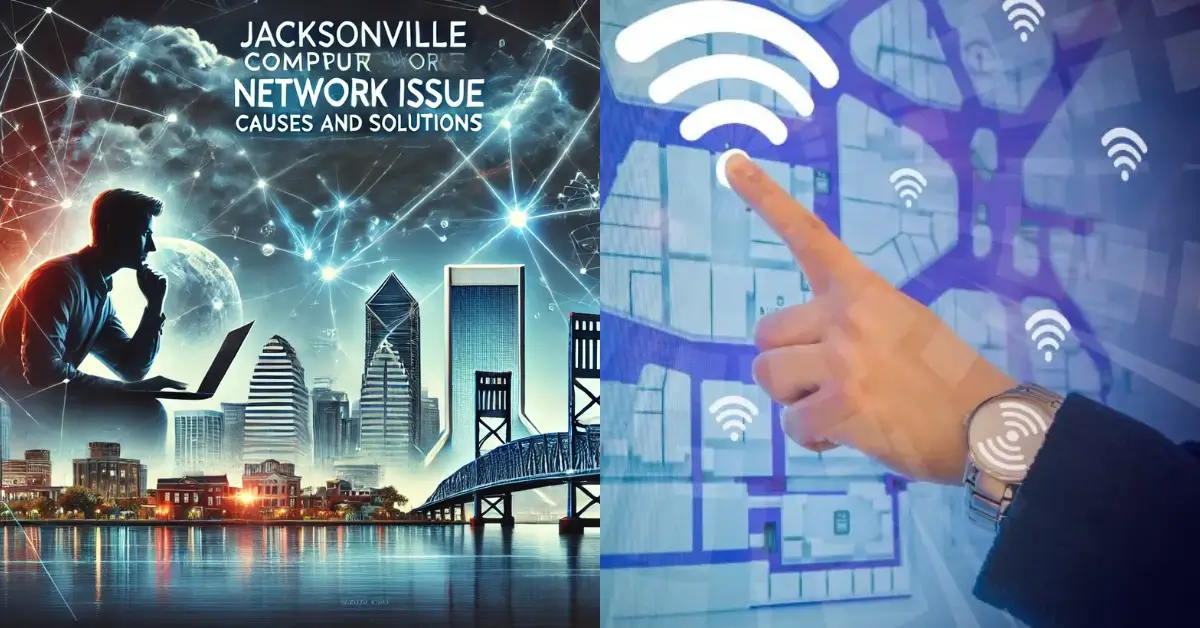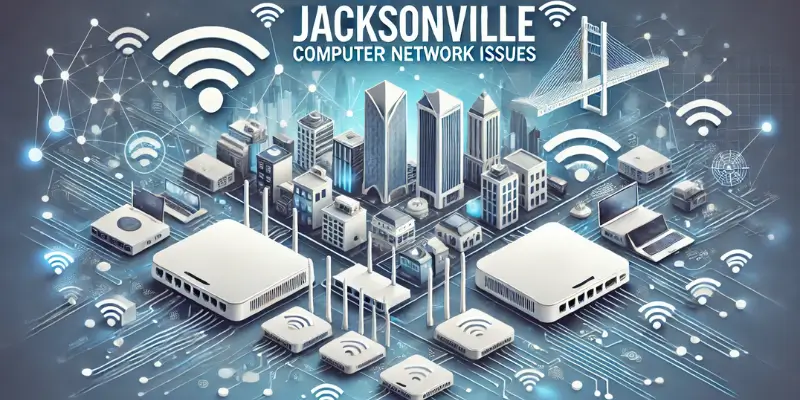Understanding the Jacksonville Computer Network Issue: Causes, Impact, and Solutions

In a world increasingly reliant on digital connectivity, even brief network disruptions can ripple through communities. In September 2024, Jacksonville faced an unprecedented computer network outage that tested its infrastructure and resilience.
The incident disrupted municipal services, impacted local businesses, and raised concerns about cybersecurity. However, this event also served as a valuable lesson in adaptability and innovation, underscoring the need for robust IT systems and proactive measures.
This article delves into the details of the Jacksonville computer network issue, analyzing its causes, impact, and the city’s commendable efforts to overcome the challenge. From government responses to lessons for the future, the story of Jacksonville’s recovery is both inspiring and instructive.
Overview of the Jacksonville Computer Network Issue
The Jacksonville computer outage began on September 11, 2024, disrupting municipal IT systems. Initially thought to be a configuration problem, further investigation revealed a hardware failure within the city’s network infrastructure. The issue affected access to critical services, including websites, billing systems, and mobile applications.
Despite the disruption, Jacksonville’s leadership swiftly addressed the crisis, ensuring transparent communication with residents and collaborating with federal agencies such as the FBI and Homeland Security. Their actions highlighted the importance of quick decision-making and robust partnerships in mitigating such challenges.

Timeline of the Disruption: Key Events and Escalation
The timeline of the network disruption illustrates the escalation and resolution of the issue:
- Day 1: The network outage begins, disrupting municipal services and raising concerns among residents. Initial efforts to identify the problem focus on software configurations.
- Day 3: The root cause is identified as a hardware failure, prompting collaboration with IT vendors to procure replacement components.
- Day 7: Services begin to be restored incrementally as new hardware is installed and tested.
- Day 10: Full functionality is restored, with officials emphasizing the lessons learned and plans to prevent future occurrences.
This timeline reflects Jacksonville’s dedication to addressing the issue swiftly and effectively, minimizing the long-term impact on residents and businesses.
Read Also: MyPascoConnect
Affected Services and Public Impact
The network disruption had widespread effects on public services. Residents struggled to access utility billing systems, permitting services, and public information portals. These outages led to delays in critical processes, such as obtaining permits and paying utility bills.
For the public, the downtime highlighted the essential nature of IT infrastructure in daily life. However, Jacksonville’s open communication and prompt restoration efforts reassured residents, emphasizing the city’s commitment to serving its community.
Economic Ramifications for Local Businesses
Local businesses bore a significant burden due to the network failure. The inability to obtain permits or access essential documentation delayed projects and disrupted operations. Small businesses, in particular, faced challenges in adapting to the sudden outage.
Nevertheless, Jacksonville’s proactive response minimized long-term economic damage. The city’s collaboration with stakeholders ensured that businesses received the support needed to recover quickly, demonstrating its resilience and commitment to economic stability.
Initial Diagnosis: Configuration vs. Hardware Failures
At the outset, the issue was attributed to a configuration error. However, deeper analysis revealed a hardware failure within the city’s IT infrastructure. This misdiagnosis delayed initial resolution efforts but ultimately underscored the need for robust diagnostic processes.
This distinction highlighted the complexities of modern IT systems and the importance of regular hardware and software assessments to prevent similar incidents in the future.
Government and Agency Responses to the Crisis
Jacksonville activated its Emergency Operations Center to manage the crisis effectively. The city collaborated with the FBI and Homeland Security, leveraging their expertise to address the issue and ensure the network’s security.
This multi-agency approach underscored the importance of partnerships in addressing IT challenges. Jacksonville’s leadership and coordination during the crisis set a benchmark for other municipalities facing similar issues.
Addressing Public Concerns About Cybersecurity
Although the incident was not a cyberattack, it raised concerns about cybersecurity. Residents questioned the safety of their data and the city’s preparedness for potential threats.
Jacksonville’s transparent communication and collaboration with federal agencies reassured the public. By emphasizing the absence of malicious activity and outlining steps to strengthen cybersecurity, the city demonstrated its commitment to protecting its residents.
Technical Analysis: Root Causes and Solutions Implemented
The root cause of the outage was a critical hardware failure in the city’s network infrastructure. IT vendors worked closely with Jacksonville to replace the faulty components and restore functionality.
This resolution highlighted the importance of maintaining updated hardware and establishing strong relationships with technology providers. Jacksonville’s approach serves as a case study in effective crisis resolution.
Lessons Learned: IT Infrastructure Vulnerabilities
The Jacksonville network disruption underscored vulnerabilities in IT infrastructure. Aging hardware, insufficient redundancy, and delayed diagnostics were key factors in the incident.
Addressing these vulnerabilities requires proactive investments in technology and regular system evaluations. Jacksonville’s experience emphasizes the importance of learning from challenges to build a more resilient future.
Recommendations for Future Network Reliability
To prevent similar disruptions, Jacksonville has implemented several recommendations:
- Modernizing Hardware: Replacing outdated components with high-performance alternatives.
- Implementing Redundancy: Establishing backup systems to maintain functionality during outages.
- Conducting Regular Maintenance: Ensuring that both hardware and software are up-to-date.
These measures aim to enhance network reliability and protect against future challenges.
The Role of Federal Agencies in Assisting Local Governments
Federal agencies such as the FBI and Homeland Security played a vital role in Jacksonville’s recovery. Their expertise and resources were instrumental in diagnosing the issue and preventing further complications.
This collaboration highlights the value of federal support in addressing local IT challenges, fostering a sense of security and preparedness.
Importance of Cybersecurity Training for Municipal Staff
Cybersecurity training for municipal staff is essential in safeguarding IT systems. Jacksonville plans to implement regular training sessions to ensure employees can identify and respond to potential threats effectively.
These efforts demonstrate the city’s proactive approach to enhancing IT resilience and protecting its community.
Exploring Modern Solutions: Cloud Integration and Backup Systems
Jacksonville is exploring cloud integration and backup systems to enhance network reliability. Cloud-based solutions provide scalability and redundancy, ensuring uninterrupted access to services.
By embracing modern technology, Jacksonville aims to build a future-ready IT infrastructure that can withstand potential disruptions.
Community Feedback on Service Downtime
Residents expressed frustration during the outage but appreciated Jacksonville’s transparency and swift response. Community feedback has informed the city’s plans to improve communication and expedite service restoration during future incidents.
This engagement underscores the importance of listening to community concerns and addressing them effectively.
The Broader Implications of IT Failures in Urban Centers
Jacksonville’s experience highlights the broader implications of IT failures in urban centers. From public safety to economic stability, reliable IT systems are essential for city operations.
By addressing vulnerabilities and investing in robust infrastructure, municipalities can safeguard their communities and maintain trust.
How Jacksonville Plans to Prevent Future Disruptions
Jacksonville’s comprehensive plan to prevent future disruptions includes modernizing infrastructure, enhancing cybersecurity, and fostering collaborations with federal agencies and IT vendors.
These measures reflect the city’s dedication to continuous improvement and resilience.
Leveraging Technology for Enhanced Urban Service Delivery
Technology plays a crucial role in urban service delivery. Jacksonville is leveraging advanced systems to streamline operations and improve public services, ensuring a seamless experience for residents.

Why Regular Maintenance is Critical for IT Resilience
Regular maintenance is a cornerstone of IT resilience. Jacksonville’s experience underscores the need for routine evaluations and updates to prevent disruptions and ensure reliability.
What Other Cities Can Learn from Jacksonville’s Experience
Other cities can learn valuable lessons from Jacksonville’s experience:
- Proactive Planning: Anticipating potential issues through regular assessments.
- Transparent Communication: Keeping the public informed during crises.
- Collaboration: Leveraging partnerships to address challenges effectively.
Read Also: Baltimore Orioles vs San Francisco Giants Match Player Stats
Final Thoughts
Jacksonville’s response to its computer network issue is a testament to the city’s resilience and adaptability. By learning from challenges and implementing robust solutions, Jacksonville has set a precedent for other municipalities.
FAQs
Was the Jacksonville network issue caused by a cyberattack?
No, the issue was due to a hardware failure, not a cyberattack.
How long did the outage last?
The disruption lasted approximately 10 days, with services restored incrementally.
What measures is Jacksonville taking to prevent future outages?
The city is modernizing its infrastructure, implementing redundancy systems, and enhancing cybersecurity measures.





